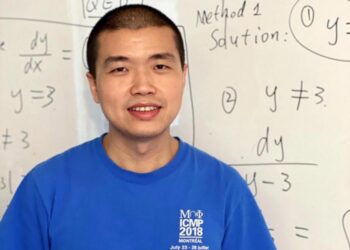Organic solid-state lasers (OSLs) hold immense promise for a wide range of applications due to their flexibility, colour tunability, and efficiency. However, they are difficult to make, and with over 150,000 possible experiments required to conduct to find successful new materials, discovering them all would be the work of several lifetimes. In fact, in the previous few decades, only 10-20 new OSL materials have been tested. Researchers with the Acceleration Consortium based at the University of Toronto, took up this challenge and used self-driving lab (SDL) technology that, once set up, enabled them to synthesize and test over 1000 potential OSL materials and discover at least 21 top performing OSL gain candidates in a matter of months.
Organic solid-state lasers (OSLs) hold immense promise for a wide range of applications due to their flexibility, colour tunability, and efficiency. However, they are difficult to make, and with over 150,000 possible experiments required to conduct to find successful new materials, discovering them all would be the work of several lifetimes. In fact, in the previous few decades, only 10-20 new OSL materials have been tested. Researchers with the Acceleration Consortium based at the University of Toronto, took up this challenge and used self-driving lab (SDL) technology that, once set up, enabled them to synthesize and test over 1000 potential OSL materials and discover at least 21 top performing OSL gain candidates in a matter of months.
An SDL uses advanced technologies such as artificial intelligence and robotic synthesis to streamline the process of identifying novel materials – in this case, materials with exceptional lasing properties. Up until now, SDLs have usually been confined to one physical lab in one geographic location. This paper titled “Delocalized Asynchronous Closed-Loop Discovery of Organic Laser Emitters” published in the journal Science, showcases how the research team used the concept of distributed experimentation, where tasks are divided among different research sites, to achieve the joint goal faster. For this research, labs from Toronto and Vancouver in Canada, Glasgow in Scotland, Illinois in the USA, and Fukuoka in Japan were involved.
By using this method, each lab was able to contribute its unique expertise and resources- which ultimately played a key role in the success of this project. This decentralized workflow, managed by a cloud-based platform, not only enhanced efficiency but also allowed for the rapid replication of experimental findings, ultimately democratizing the discovery process, and accelerating the development of next-generation laser technology.
“What this paper shows is that a closed-loop approach can be delocalized, researchers can go all the way down from the molecular state down to devices and you can accelerate the discovery of materials that are very early in the process of commercialization,” said Dr. Alán Aspuru-Guzik, director of the Acceleration Consortium. “The team designed an experiment that went all the way down from molecule to device- with the final devices being made in Japan. They were scaled up in Vancouver and then transferred to Japan for characterization.”
The discovery of these novel materials represents a significant advancement in the field of molecular optoelectronics. It has paved the way for enhanced performance and functionality in OSL devices and set a precedent for future delocalized discovery campaigns in the field of materials science and self-driving labs.
About the Acceleration Consortium
The Acceleration Consortium is a network of government, academia, and industry working to accelerate the discovery of materials. Based at the University of Toronto, the AC accelerates materials discovery by developing robust and scalable self-driving labs (SDLs). SDLs combine AI, robotics, and high-throughput experimentation to develop new materials with a desired functionality. As recipients a $200 million Canada First Research Excellence Fund (CFREF) grant – the largest ever by a Canadian university – the AC is building capacity to accelerate the design and commercialization of materials for sustainability and health applications to help society solve some of its most significant challenges. Visit acceleration.utoronto.ca to learn more.
Journal
Science
Article Title
Delocalized Asynchronous Closed-Loop Discovery of Organic Laser Emitters
Article Publication Date
17-May-2024
Discover more from Science
Subscribe to get the latest posts sent to your email.



